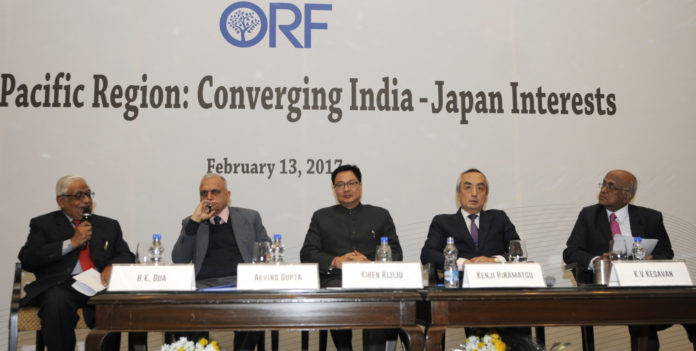
Shri Kiren Rijiju addresses seminar on ‘Indo-Pacific Region: Converging India-Japan interests’
The Minister of State for Home Affairs Shri Kiren Rijiju addresses the seminar on ‘Indo-Pacific Region: Converging India-Japan interests’, organised by Observer Research Foundation (ORF) here today.
Speaking on the occasion, Shri Kiren Rijiju said that the relation between India and Japan are rooted in long history and both the countries share common values such as commitment to democracy, supremacy of law, human rights and global peace. Sixty four years have passed since both India and Japan established their diplomatic relations and during this period, they have been able to build a very robust partnership based on mutually convergent strategic and economic interests, he added.
On Strategic ties, the Minister said that India and Japan have signed a Declaration on security cooperation and taken several steps to strengthen the cooperation in defence production and civil nuclear energy. He also highlighted Japan’s participation in the Malabar joint exercises for maritime security.
On economic ties, Shri Kiren Rijiju said that Japan is supporting several mega-infrastructure projects like the Delhi-Mumbai Freight Corridor, Delhi-Mumbai Industrial Corridor, Chennai-Bangalore Industrial Corridor and Mumbai-Ahmadabad high speed railway. He said that both countries have also entered into a comprehensive economic partnership agreement to boost trade and investment. Japanese private investment has made a great impact particularly on the automobile sector in India, he added.
Shri Rijiju said that India has been the biggest recipient of Japan’s Official Development Assistance (ODA) loans since 2003. He said that Japanese aid has flowed into several critical sectors such as power, transport, communication, irrigation, connectivity projects in Northeast India, modernization of railways and ports.
ORF began its journey in 1990 and brought together leading Indian economists and policymakers to present the agenda for India’s economic reforms. From primarily looking inward and engaging with domestic reforms, to gradually forging global partnerships, ORF today plays a seminal role in building political and policy consensus that enables India to interact with the world. It provides non-partisan, independent, well-researched analyses and inputs to diverse decision-makers in Governments, business communities, and academia and to civil society around the world. ORF seeks to lead and aid policy thinking towards building a strong and prosperous India in a fair and equitable world.



















